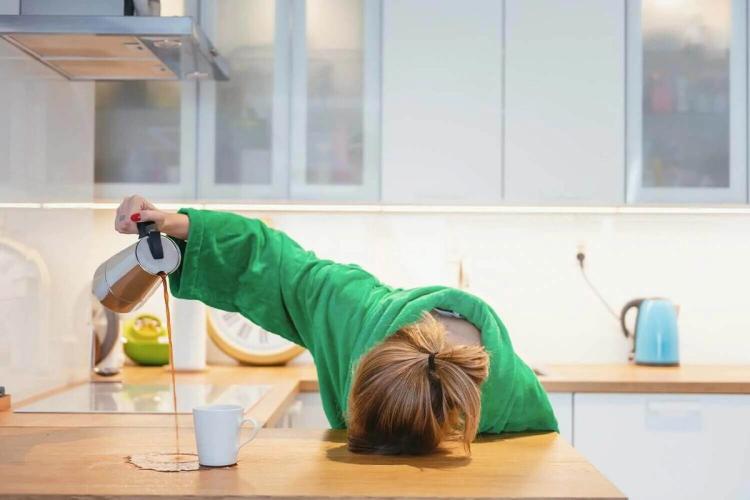
Why Does Coffee Make Me Sleepy: Tips To Avoid Caffeine Crash
Some days, you can take on the world without looking back. Other days, you may need some help to get through the day. Usually, that help comes in the form of coffee—like espresso or iced coffee drinks. Coffee is a great pick-me-up, especially when the mid-afternoon urge for a nap hits. Why do you think some cultures have siestas?
Tiredness is universal. Workdays are long, and while coffee is a great tool to help you wake up and feel energized, sometimes it can have the opposite effect. We’re going to dive into why your current coffee routine may not be serving you best, what effects coffee has on your central nervous system, and how to avoid a caffeine crash.
Caffeine Crash Course
If you're like half of the United States, you probably drink coffee every day. Coffee has seen you through the good days and the bad ones.
Despite being the go-to drink when people feel sleepy, coffee can sometimes be the cause of that tiredness cycle. You’ve heard of caffeine—the main source of energy in your daily cup of coffee—but have you ever really thought about what it is and what it does?
What Is Caffeine?
Caffeine is a naturally occurring substance found in a variety of plants, including coffee beans, tea leaves, and cacao pods (used to make chocolate). While caffeine is a natural compound, some pharmaceutical companies also manufacture artificial caffeine to add to certain products.
People react to caffeine differently depending on how fast they metabolize it. However, the generally recommended amount is 400 mg of caffeine per day, which equals about four 8-ounce cups of coffee.
Depending on their sensitivity to caffeine, some people may feel better drinking more or less than the standard recommended amount.
What Does Caffeine Do?
Caffeine boosts energy, stimulates nerve impulses and cognitive responses, and can even improve mood. But how does it affect our nervous system?
The human body is full of hormones that regulate metabolism, exercise, and even rest. The hormone responsible for helping you relax is called adenosine. Caffeine blocks adenosine receptors in the brain, acting like a roadblock in traffic. The more caffeinated beverages you drink—like coffee or energy drinks—the less adenosine is released, leading to a buildup, much like a traffic jam.
This raises your heart rate and perceived energy level, making you feel alert and active. However, when caffeine begins to leave your system, the built-up adenosine floods into your brain, making you feel drowsy or groggy—often in the middle of the afternoon. This is what’s known as a caffeine crash (similar to the sugar crash kids experience after eating lots of candy). Our usual response? Drinking more coffee, which starts the cycle all over again.
While blocking adenosine can be helpful during the day, having caffeine in your system too late can make it harder to fall asleep at night, affecting your sleep-wake cycle.
How Do I Avoid Caffeine Crashes?
Like most things in life, caffeine has its pros and cons. While it can give you an energy boost in the morning, it can also lead to withdrawal symptoms and energy crashes later on.
Here are some ways to help your body find balance without completely giving up your daily cup of coffee.
Hydration Station
Since caffeine is a diuretic, coffee causes your body to lose water faster. This can lead to dehydration, which contributes to tiredness, headaches, and even dry mouth.
A good rule of thumb is to drink two cups of water for every cup of coffee. Yes, it means more trips to the bathroom, but staying hydrated also helps you feel energized and boosts your metabolism.
Don’t Drink Coffee on an Empty Stomach
As mentioned earlier, hormones help keep our bodies in balance. When they get out of sync, it can be hard to restore equilibrium.
Drinking coffee on an empty stomach can throw your body off balance. Since caffeine is a stimulant, it kicks your metabolism into high gear. However, if your body doesn’t have food for fuel, you may experience shakiness, low blood sugar, and even more tiredness.
So, before you reach for that first cup, try grabbing a granola bar or a sandwich to keep your energy levels stable.
Know Your Caffeine Limits
The average person feels the effects of caffeine for four to six hours after consumption, with peak effects occurring after just one hour. The more you drink, the more likely you are to experience negative side effects instead of the energy boost you’re looking for.
Many of these effects are caused by cortisol, a stress hormone that puts your brain in “fight or flight” mode.
Shakiness, headaches, stomachaches, and anxiety are all signs that your body may need a break from coffee. This doesn’t mean you have to cut it out completely—just slow down and make sure you’re giving your body the nutrients it needs.
So, Should I Just Switch to Decaf?
At this point, you might be wondering if caffeine is even worth it. Decaffeinated coffee is a great alternative if you want to reduce caffeine intake without giving up coffee altogether. However, there are other ways to make sure you’re staying within healthy limits.
Set a Time Limit
If you struggle to fall asleep or experience chronic fatigue, your coffee consumption may be affecting your sleep-wake cycle.
Try setting a cut-off time for caffeine intake. Depending on your sensitivity, switching to decaf between 3 and 5 p.m. may help restore your sleep schedule. Experiment with different time limits and practice self-discipline to find what works best for you.
Back to Black
Do you add a lot of sugar and cream to your coffee? While it enhances flavor, it can also contribute to a quicker caffeine crash, especially if you drink coffee without eating.
Switching to black coffee can help eliminate excess sugar while reducing the chances of an afternoon slump.
Coffee Concentrates
Black coffee is a great option, but some coffee lovers still crave a hint of sweetness. In these cases, coffee concentrates like Javvy’s Mocha Coffee Concentrate or Pistachio Coffee Concentrate provide a smooth and creamy taste without messing with blood sugar levels.
Plus, our coffee concentrates are super quick and easy to use. Even if you’re rushing out the door, you’ll have time to grab a breakfast bar for a balanced morning coffee experience.
Moderation Is Key
There’s no one-size-fits-all approach to caffeine consumption. Everyone’s body responds differently, and it’s important to listen to what yours is telling you.
Some people can drink twelve cups of coffee without feeling a thing (though this amount of caffeine isn’t recommended), while others feel jittery after just one.
If you’re struggling to sleep, try cutting back on coffee and drinking more water. If you’re sleeping well but still feeling sluggish during the day, you may benefit from an extra cup. The key is to find what works for you without feeling guilty about an afternoon pick-me-up when you need it.
Final Thoughts
Coffee may be an essential part of your day, but without proper balance, caffeine can contribute to feelings of fatigue and lead to energy crashes. Keep these tips in mind to stay alert and energized all day long—without giving up your daily cup of joy.







